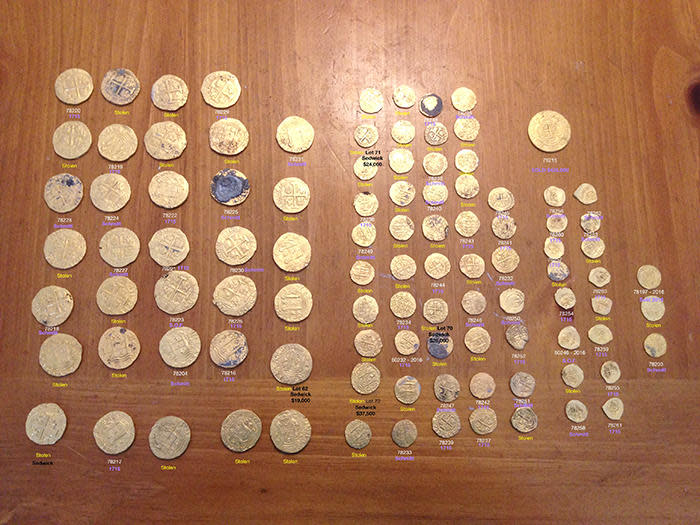Fort Pierce, Florida — A collection of 37 gold coins — with a combined value estimated at more than $1 million — have been recovered after they were stolen by salvagers back in 2015 from a famous 18th century shipwreck off Florida’s Treasure Coast, state authorities announced Tuesday. A professional treasure hunter has been charged in connection with the case.
The Florida Fish and Wildlife Conservation Commission announced the recovery in a news release, calling it a “major milestone in a long-standing investigation into the theft and illegal trafficking of these priceless historical artifacts.” As required by state and federal law, the recovered artifacts will be returned to their “rightful custodians,” the agency added.
The suspect, Eric Schmitt, is facing charges of dealing in stolen property.
Advertisement
Advertisement
The coins were aboard the 1715 Spanish Treasure Fleet, a convoy of 11 ships filled with treasure from the New World that were lost to a hurricane in July 1715. The shipwreck gave Florida’s Treasure Coast its name.
Schmitt spoke to “CBS Mornings” in July 2015 after his family’s business, Booty Salvage, helped find the coins while searching in shallow waters off the coast of Fort Pierce.

Stolen gold coins came from 1715 sunken fleet off Florida’s east coast / Credit: Florida Fish and Wildlife Conservation Commission
“It’s definitely a passion. You gotta want to do this,” Schmitt told CBS News at the time. “…Mostly what we find is garbage on a daily basis — beer cans and lead sinkers and bullets.”
In 2015, members of the Schmitt family, working as contracted salvage operators for a company called “1715 Fleet – Queens Jewels,” uncovered 101 gold coins worth $4.5 million, FWC said. Fifty-one of these coins were reported correctly and adjudicated, but 50 coins were not disclosed and were subsequently stolen. FWC investigators, in collaboration with the FBI, launched an investigation on June 10 for the missing coins.
Advertisement
Advertisement
Evidence linked Schmitt, to the illegal sale of multiple stolen gold coins between 2023 and 2024, FWC said.
Authorities executed multiple search warrants, recovering the stolen coins from private residences, safe deposit boxes and auctions, FWC said. Five stolen coins were reclaimed from a Florida-based auctioneer, who unknowingly purchased them from Schmitt.
Advanced digital forensics identified metadata and geolocation data linking Schmitt to a photograph of the stolen coins taken at the Schmitt family condominium in Fort Pierce, officials said. Furthermore, Schmitt took three of the stolen gold coins and placed them on the ocean floor in 2016 to be found by the new investors of Queens Jewels, the agency said.
The FWC worked with historical preservation experts, including Mel Fisher-Abt. to authenticate and appraise the recovered artifacts.

Booty Crew recovered items from sunken ships in 1517 off Fort Pierce. / Credit: Florida Fish and Wildlife Conservation Commission
Investigators are attempting to recover the remaining 13 stolen coins.
Advertisement
Advertisement
More in U.S.
“This case underscores the importance of safeguarding Florida’s rich cultural heritage and holding accountable those who seek to profit from its exploitation,” FWC Investigator Camille Soverel said in a statement.
The gold coins had been minted in Lima, Peru, between 1697 and 1712. Seven days after departing from Havana, Cuba, the 11 ships of the fleet were lost in a hurricane on July 31, 1715, along with at least $400 million worth of gold and jewelry.
One of those, ships, Urca de Lima, opened to the public in September 1987 in Fort Pierce and is protected as part of the Florida Underwater Archaeological Preserves.
For centuries, people have been searching the area for the shipwreck’s treasure.
Advertisement
Advertisement
CBS News reported in 2015 that the state of Florida gets 20% of the profits of treasure hunting off the top. The Schmitt family, as a subcontractor, was to split the bounty 50-50 with Queens Jewels, LLC, the company that owned the rights to the wreckage at the time.
“The more we do this, the bigger the finds we make, so I kind of less believe in luck and more believe in our hard work,” Schmitt told CBS News in 2015.
Some North Carolina homeowners still can’t return home after Helene landslides
New White House rule would make weight loss drugs available for people on Medicare and Medicaid
CAI advances readiness and excellence in life sciences and mission-critical fields.
EMEA Tribune is not involved in this news article, it is taken from our partners and or from the News Agencies. Copyright and Credit go to the News Agencies, email news@emeatribune.com Follow our WhatsApp verified Channel




